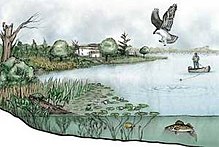
Back مذهب طبيعي ديني Arabic طبیعتگرایی دینی Persian Naturalisme religieux French Naturalismo (religione) Italian Naturalismo religioso Portuguese Natyralizmi fetar Albanian

Religious naturalism is a framework for religious orientation in which a naturalist worldview is used to respond to types of questions and aspirations that are parts of many religions.[1] It has been described as "a perspective that finds religious meaning in the natural world."[2]
Religious naturalism can be considered intellectually, as a philosophy, and it can be embraced as a part of, or as the focus of, a personal religious orientation.[3] Advocates have stated that it can be a significant option for people who are unable to embrace religious traditions in which supernatural presences or events play prominent roles, and that it provides "a deeply spiritual and inspiring religious vision" that is particularly relevant in a time of ecological crisis.[4]
- ^ Stone, Jerome A. (2008). Religious naturalism today : the rebirth of a forgotten alternative. Albany, NY: State University of New York Press. pp. xi, 226. ISBN 978-1-4416-2106-1. OCLC 436281667.
- ^ Murry, William R. (2006). Reason and reverence : religious humanism for the 21st century. Boston, MA: Skinner House Books. pp. xvi. ISBN 1-55896-518-1. OCLC 69331976.
- ^ Stone 2008, p. xii, 226-227.
- ^ Crosby, Donald A.; Stone, Jerome A. (2018). "Introduction". In Crosby, Donald A.; Stone, Jerome A. (eds.). The Routledge Handbook of Religious Naturalism. Donald A. Crosby, Jerome A. Stone. Oxon: Routledge. p. 3. ISBN 9781351857536. OCLC 1022845932.